By Dr. Raymond G. Hebert
Thomas More University
Part 79 of our series, “Retrospect and Vista II”: Thomas More College/University, 1971–2021
Sororities and fraternities have long been a part of the history of student involvement at Villa Madonna College (VMC), now Thomas More University. Young ladies launched the first sorority at Villa Madonna, when it was still a college for women.
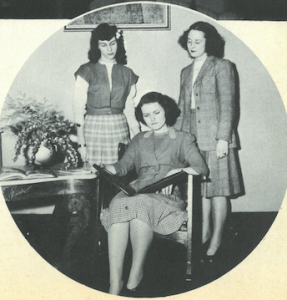
1947 Alpha Lambda Mu (ΑΛΜ) Sorority Officers. Seated: Pat Willett ’47, President. Standing: Marilyn Menninger ’48, Treasurer; Bernice Kramer ’47, Secretary. (TMU Archives )
The Alpha Lambda Mu (ΑΛΜ) sorority was founded in 1933. In 1934, articles about the sorority began appearing in The Kentucky Post. The first of these mentioned that “Miss Catherine Landwehr” of Alpha Lambda Mu was sponsoring “a tea in honor of the graduates of the Catholic High Schools and Academies of northern Kentucky” (“Sorority Leader,” Kentucky Post, May 12, 1934, p. 4). The sorority’s goals included “enhancing Christian Culture.” Not until 1946 — when the college published the first issue of its Triskele yearbook — do historians gain a glimpse into the many student activities of VMC. By 1947, for instance, we know that the sorority’s officers were: Patricia Willett ’47, President; Marilyn Menninger ’48, Treasurer; and Bernice Kramer ’47, Secretary. Nancy O’Connell was the “Sweetheart of the Fraternity” that year. The Moderator was Rev. Sylvester Kleman, C.P.P.S., who served as the Adviser for both the sorority and the fraternity (Triskele, 1947, p. 37).
Fraternities began after World War II at VMC, when the college became coeducational, Sigma Alpha Lambda (ΣΑΛ) Fraternity, founded in 1947 at VMC, was based in a Catholic tradition, namely “Christian Social Order, Catholic Action and Letters.” The charter members included: Dick Schuh ’48, Vice President; Hal Laughlin ’47, President; Jack Lalley ’48, Treasurer; Robert Riegler ’48, Secretary; James Nolan ’47; Robert Vogel Pohl ’48, and Nick Cleves ’47, father of later TMC President, Rev. William Cleves.
In 1965, the Rho Chapter of Alpha Delta Gamma (ΑΔΓ) fraternity was founded at VMC, labeled then as the “national Catholic fraternity” in a press release and article published in both the Messenger and Kentucky Post-Times Star (VMC press release, May 16, 1965, TMU Archives). Alpha Delta Gamma has prided itself in being “a fraternity which does not restrict its membership in any way. Catholic, Protestant and Jew are all welcomed by Brotherhood” (Undated national brochure, Alpha Delta Gamma, p. 7). That brochure highlighted the organization’s dedication to “five fundamental areas of endeavor in the development of College men: SOCIAL/SERVICE/SPIRITUAL/SCHOOL SPIRIT/ and SCHOLASTIC.” The fraternity’s fundamental ideals include the commitment “not to divide but to unite and in so doing to lead. We seek not the easy or the expedient, but the genuine and the enduring (so as to be) . . . not merely a Fraternity for college days, but the Fraternity for life” (brochure, p. 3).
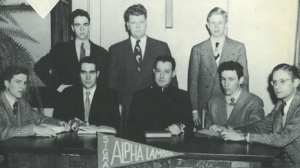
1947 Sigma Alpha Lambda (ΣΑΛ) Fraternity. Seated: Dick Schuh ’48, Vice President; Hal Laughlin ’47, President; the Reverend Sylvester Kleman C.P.P.S., Adviser; Jack Lalley ’48, Treasurer; Robert Riegler ’48, Secretary. Standing: James Nolan ’47, Robert Vogelpohl ’48, Nick Cleves ’47. (TMU Archives)
Alpha Delta Gamma’s newly formed Rho Chapter was fully approved by the Villa Madonna administration at the end of the 1964–1965 academic year. In the words of Rev. Louis B. Brinker, Dean of Students, “the purpose of the fraternity is to recruit as members, young men who are considered leaders socially, scholastically and spiritually among the student body.” The press release named the charter members as: Daniel Wilkens (President), Richard Wilson, Richard Roenker, Dennis Deye, Roger Moellering, George Schwegman, Joseph Roesel, Michael Goldberg, Daniel Roth, James Stautberg, Timothy Kloenne, James Ornduff, Charles Eilerman, Gregory Bennings, Anthony Gertz, David Lloyd, James Thelen and James McCoy (Mildred Atkinson to Messenger and Post Times Star, May 18, 1965, TMU Archives). The organization took hold after its official founding date of April 30, 1966, with outstanding work done by campus leaders like Dan Wilkens, Mick Goldberg, Fred McLane, Ken Moorhead and Steve Calvert. Two other active members were Bill Tiemeier, the President of Student Council, and Rick Jarvis, his Vice President. A later press release, from Public Relations Director Monique R. High, reported a “pledge class of 23,” a remarkably large number “with a committed membership group that had grown from a small group of dedicated men to a large, strong part of an active national fraternity.” This information was all part of the context for the announcement that, in only the second year of its existence, the Rho Chapter was “granted the highest award that any active chapter can receive from the national chapter . . . for outstanding activity extending in many areas.” (Monique High, Press Release to Messenger, Catholic Telegraph, Post Times Star and the Knights of Columbus, August 26, 1969, TMU Archives).
The August 1969 press release also described the multiplicity of events/activities that the fraternity started and continued in just a short timespan: 1) serving as head coordinators for the St. Patrick’s Day Parade in Cincinnati since the spring of 1967; 2) working as a group at multiple festivals during the summer months, including the: Girls’ Town Festival, St. Mary’s Girl Hospital and Sacred Heart Seminary” among others; 3) active in Freshman Orientation and Open Houses; 4) the most popular Monte Carlo Night on campus, with “stuffed animals auctioned off”—all with the result in 1968–1969 of winning the Organization of the Year Award for being the most outstanding organization (nationally)” (Monique R. High, Press Release, August 26, 1969, TMU Archives).
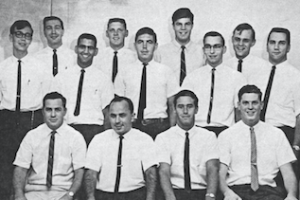
Alpha Delta Gamma (ΑΔΓ) charter group in 1965. Front Row: Denny Deye, Dan Wilkens, Dick Wilson, Roger Moelliering. Center Row: Chuck Eilerman, Mick Goldberg, Bill Robinson, Tom Calme, Jr., Jim Stautberg. Back Row: Tom Gertz, Jim Thelen, Tim Kloemie, Jr., George Schwengman. (TMU Archives.)
Dan Wilkens, the charter President of Alpha Delta Gamma from the 1960s, offered some touching reminiscences of those early years. Wilkens recalled the camaraderie of the initial group (1965–1966) and their “future wives who served as typists in a room above a typewriter shop on Twelfth Street in Covington.” In addition, he mentioned the good fortune of having that year’s (Summer 1965) National Convention in Louisville on the steamer Belle of Louisville, when “several underclassmen found some lifelong relationships that kept the fire burning in the Fall of 1965.” He then talked about the importance of the next generation, led by “Jim Lang, Kenny Moorhead and Jeff Walters,” who strengthened the fraternity so it could gain momentum and become what it needed to be “for both the men and women at Villa Madonna,” especially as it transitioned to Thomas More. The result, “with help from Dick Maday and Ben Aranda from the ΑΔΓ National Fraternity,” was for the Rho Chapter of ΑΔΓ “to become a real leader at Thomas More in the late 1960s” (Dan Wilkens, Reminiscences of the founding of the Rho Chapter of the Alpha Delta Gamma Fraternity at Villa Madonna College shared with David Macke, April 13, 2001).
A similar trajectory and degree of interest continued through the 1970s, with the next peak coming through the leadership of officers like Jeff Mando in the late 1970s and Andrew Schoettker and David Macke in the 1980s. Having National Conventions in Louisville (1978 and 1985) and Greater Cincinnati (1979, 1983, and 1989) also proved important. Meanwhile, a participation among Rho Chapter leaders at the national level began in the early 1980s with Dave Macke serving as Regional Director in 1981–1982, Steve Koplyay as Board Representative in 1982–1983, Andrew Schoettker as Editor/Steward, and Carlo Wessels as Steward. In 1982–1984, Dave Macke moved up to National Vice President, eventually serving as National President, 1984–1986. Jeff Mando served as Chief Justice in those same years. Andrew Schoettker, a Macke classmate, would later follow in his footsteps as National President from 1988–1990. Mando, Macke, and Wessels served in other national offices, and Michael Esselman as Vice President for two terms: 1992–1994 and 1994–1996. Through the rest of the 1990s, fraternity membership at Thomas More declined following a hazing incident. National involvement, however, included Dave Macke as Historian in 1995–1996 and 1996–1997. This was followed by interest in a chapter revival at Thomas More in 2001.

Jeff Mando and ADG colleagues at the Alumni Awards Banquet in the fall of 2019, when he was honored with the Professional Achievement Award. With his ADG Colleagues: Aaron Judd ’09; Dave Macke ’81; Andy Schoettker ’81; Jeff Mando ’80; Lou Esselmann ’82; and Chris Sapp ’95. (TMU Archives)
The revived Alpha Delta Gamma fraternity at Thomas More followed hard work and alumni support. In 2004–2005, Guillermo Aguero served as Student Representative on the national Board, and Christopher Sapp as a Steward. Caleb Finch was the Student Representative the following year and then Vice President for Internal Affairs in 2007–2008 and 2008–2009. Christopher Sapp served as Executive Vice President from 2008–2010 and National President for the next two years, 2010–2012. Other active members at the national level included Aaron Judd and Jeff Wyrick. In another significant award category, for the “Mac Boland Alpha Delta of the Year” Award, the Thomas More Rho Chapter had six recipients across 37 years: Dennis Helmer (1972); David Macke (1981); Carlo Wessels (1983); Tom Beck (2004); Caleb Finch (2007) and Chris Woodward (2009). Also impressive were its 10 “Most Outstanding Chapter” Awards; 5 “Most Outstanding Alumni Chapter” Awards; 5 “National Sweethearts” and 5 opportunities to “host National Conventions in 1971/1983/1989/2005 and, most recently, in 2016” (historical information provided by Christopher Sapp, ΑΔΓ alumni member and current TMU employee). Most impressive, though, as an example of the importance/influence of the Rho Chapter at the national level would be the recognition earned first by Dave Macke and later by Andy Schoettker. Both were named as recipients of the prestigious Alpha Delta Gamma Award of Merit. As noted in ΑΔΓ’s Historical Educational Manual, “the award is designed to be presented only on rare occasions, for extraordinary and unprecedented contributions by a member to his Fraternity for a period of not less than ten years.” Two-thirds of the entire attending group of voting delegates must agree for this achievement to be granted—with only eleven presented since the initiation of the award in 1962. Two of the eleven have been from Thomas More’s Rho Chapter: Dave Macke in 1996 and Andrew Schoettker in 2013. Only one other chapter nationally has more than one winner of this prestigious award.

David Macke, National President of Alpha Delta Gamma (ΑΔΓ), 1984 to 1986. (TMU Archives)
Among the fraternity Moderators of note, each being named “Outstanding Chapter Moderator Award” recipients, have been: Rev. John Putka (Political Science 1973); Rev. John Cahill (Philosophy 1982) and Thomas Gilday (Accounting 2007) (The History of Alpha Delta Gamma 1924–2016: An Educational Manual of Alpha Delta Gamma, Fourth Edition, pp. 42-62). In more recent times, in the few years before the COVID-19 pandemic, Thomas More’s Rho Chapter was recognized as the recipient of the “Outstanding Membership Growth” Chapter of the Year Award—(for having the) “largest influx of new members during the academic year in proportion to its beginning active chapter base—in 2013 and 2015” (History of Alpha Delta Gamma, p. 62). O’Brian Davis was recognized in 2014, by the National President, with the Active Award for his distinguished service in that year.
Not surprisingly, little has been possible on campus during the COVID-19 pandemic, though the Thomas More Alumni ΑΔΓ graduates are still considered to be the most active alumni group within the Alumni Association. In appreciation, over the years, Thomas More College/Thomas More University has honored a number of prominent ΑΔΓ alumni for their professional achievements. From the earlier years, William T. (Bill) Robinson has received multiple honors, including the St. Thomas More Medal, after his service as National President of the American Bar Association. Terry Egan was honored for professional achievements, following his recognition as “Kentucky’s Defense Lawyer of the Year in 2018.” Jeff Mando received a Distinguished Alumni Award as did Chris Sapp. In addition, the Alpha Delta Gamma Alumni Chapter was featured in a “Partners Saints Salute” during halftime of a Saints home basketball game (Moreover, Spring 2020, pp. 18, 22, 32). It is worthy of mention, considering the demise or mothballing of programs and organizations just before and during the pandemic, that the Rho Chapter was kept afloat as much as possible because of members like Aaron Judd who served as Vice President for Finance nationally from 2016–2018, and Executive Vice President from 2018–2020, while also serving as an ombudsman, first from 2013–2016 and, more recently, from 2020 to the present.
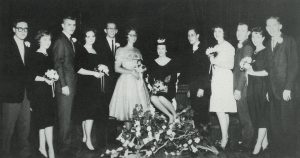
1962 Sweetheart Ball. Royal Court: Dennis Daly, Sue Baldwin, Paul Buerger, Sarah Fischer, Charles Boyer, Janet Saalfeld, Sweetheart Melinda Krogman, Joe Moeller, Sue Stapleton, Ron Eckerle, Helen Goetz and Tony Brockman. (TMU Archives)
Interestingly and sadly, the beginnings and rise of Alpha Delta Gamma on campus seemed to coincide with a lessening of interest in the older Sigma Alpha Lambda fraternity. There was competition for a time (i.e., annual football games) and an equivalent amount of community service activities (“aiding local charities and residents of local orphanages”), plus social and religious activities, “including a monthly Mass and Communion breakfast” (Triskele, 1964, p. 114). The 1968 Triskele also mentions a wide range of activities such as the “Sports Week with Beta Phi Delta of UK, the Annual Greek Bowl with Alpha Delta Gamma, an intramural basketball team, several communion breakfasts and the festive Sweetheart Ball” but there was no mention that year for Sigma Alpha Lanbda community service activities (Triskele, 1968, pp. 82-83) It is not certain when Sigma Alpha Lambda disbanded but they cannot be found as active in the 1980s Triskele yearbooks.
The Alpha Lambda Mu (ΑΛΜ) sorority continued to be active in the 1960s with their own social, religious and community activities and a major role in what was the “climax of the fraternity social season at The Sweetheart Ball” (Triskele, 1962, p. 62). In what was a high point in the transition year of 1968, with the college’s move to the suburbs, ΑΛΜ was recognized with the Organization of the Year Award as they celebrated their 35th anniversary. That year was “filled with many memorable activities including a Rush program, the modern Hamlet community service work, the Sweetest Day and Mardi Gras dances and numerous informal parties.” The highlight for the year was the traditional Installation Dinner, at which a representative group of charter members were recognized, and Lin Poston was announced as the sorority sister of the Year” (Triskele, 1968, p. 80).

Alpha Lambda Mu (ΑΛΜ) Officers in 1968: Jo Ann Dooley, President; Sue Hackman, Secretary; Margie Droege, Treasurer; Jo Ann Klett, Pledge Mistress. (TMU Archives)
Also in 1968, a second sorority called Theta Phi Alpha (ΘΦΑ) was established through the diligent efforts of a group of energetic freshmen women.” Since it was described as the “national Catholic sorority,” the goals were similar to Alpha Lambda Mu, but the focus was clearly on providing a safety net/bonding opportunity for incoming freshmen women (Triskele, 1968, p. 84).
Issues of Triskele dating from the 1980s show the emergence of another Greek fraternity, Sigma Nu Alpha (ΣΝΑ). As a national organization, its brothers agreed to live by “the foundation beliefs known as the four pillars of Academic Excellence, Cultural Awareness, Spiritual Well-Being, and Physical Fitness (Triskele, 1984, pp. 59-60). Thomas More’s chapter was founded in circa 1979. Later, it had a “Little Sister Component,” and, by 1984, “it claimed to be the largest fraternity on campus that year” (Triskele, 1984, p. 46). The primary focus nationally was “Love, Honor, Truth and Unity” and the membership list and officers included both men and women. The elected officers in 1986, for example, were “Tom Downing, President; Jeff Lawrence, VP; Joe Anhofer, Treasurer; Tina Koenig, Treasurer; Evelyn La Brier, Little Sis Representative; Jerry Haskell, Sgt. At Arms and Joe Friedl, Rush Pledge Marshal.” Among their local activities for that year were a bake sale, “Rush Picnic, Initiation, the Haunted House, More Bread and Orientation” (Triskele, 1986, pp. 60-61).
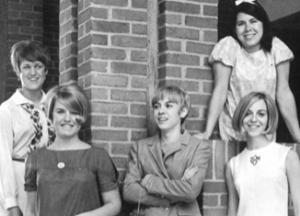
1968 Theta Phi Alpha (ΘΦΑ) sorority. (TMU Archives)
As for sororities, by 1984 neither of the two sororities of the late 1960s were still active. However, a new sorority had been established called Alpha Omicron Pi (ΑΟΠ) founded “on the ideals of character, dignity, scholarship, and college loyalty” (Alpha Omicron Pi Website). With a broader global perspective common to the 1980s, ΑΟΠ describes itself even today as the proud sponsor of the “Circle of Sisterhood (whose) mission is to leverage the collective influence of sorority women to raise financial resources for entities around the world that are removing educational barriers for girls and women facing poverty and oppression.” At Thomas More, while noting that March 1, 1984, was their formal installation as a “colony,” they proudly declared themselves that year to be “the only Greek Sorority for women on campus.” Among the activities in their first year of existence were: “support for the Arthritis Foundation, the Telethon for the Right to Life Program in the Diocese, Bake Sales, a booth at Mayfest (all for international causes) and a participation in many other social functions and campus activities (Triskele, 1984, pp. 58-59).
Other fraternities and sororities only existed for very short periods of time throughout the college’s history. The longest lasting sorority was the college’s first, Alpha Lambda Mu. By far, the oldest fraternity at Thomas More is Alpha Delta Gamma, which over its years of service, reminds us of the importance of organization and camaraderie among students and alumni.
Dr. Raymond G. Hebert is a Professor of History and Executive Director of the William T. Robinson III Institute for Religious Liberty at Thomas More University. He has just completed his 46th year at Thomas More and, with that background, will now serve as the General Editor of the official history of Thomas More College/University from 1971-2021. With a projected title of RETROSPECT AND VISTA II, it will serve as the sequel to Sr. Irmina Saelinger’s RETROSPECT AND VISTA, the history of the first 50 years of Thomas More College (formerly Villa Madonna College). He can be contacted at hebertr@thomasmore.edu.
We want to learn more about the history of your business, church, school, or organization in our region (Cincinnati, Northern Kentucky, and along the Ohio River). If you would like to share your rich history with others, please contact the editor of “Our Rich History,” Paul A. Tenkotte, at tenkottep@nku.edu. Paul A. Tenkotte, PhD is Professor of History at Northern Kentucky University (NKU) and the author of many books and articles.

























As a 1967 graduate of VMC. I have some fond memories of my couple of years as an ADG brother – especially the Jim Lang era and our (later banned) meetings at The Interlude.
I have some recollections of 1966-67 events of varying degrees of ADG/VMC historical significance that I’d be glad to share with anyone looking to fill in some of the ‘blanks’:
A formal dinner at Olsener’s (sp?) Restaurant,
The Funke Fun Fest,
The first(?) Hell Night near Big Bone,
Toilet Bowl with SAL,
In any event, keep up the good work!
Mark Koenig
Park Hills, KY